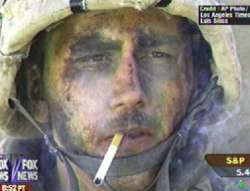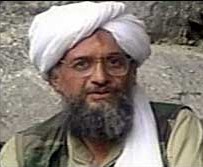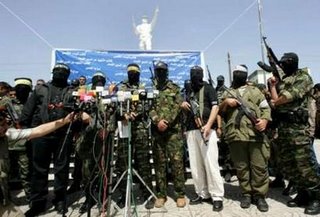BAGHDAD (AP) - The Interior Ministry is trying to gain custody of what it claimed was the body of Abu Ayyub al-Masri, a senior Iraqi official said Wednesday, amid widespread skepticism over reports that the leader of al-Qaida in Iraq had been killed. Meanwhile, a police official in Anbar province said al-Masri died when his explosives belt detonated during fighting but security forces could not retrieve the body because it was in a part of the desert controlled by the terror group. | So it's a tweezers and sponge operation |
U.S. authorities urged caution about the reports, saying they had not been confirmed and warning that even if the claim were true, the death of the shadowy Egyptian militant likely would not spell the end of the terror movement in Iraq. ``We still don't know what the status is,'' U.S. military spokesman Rear Adm. Mark Fox said Wednesday, adding the U.S. military was not involved in the operation that purportedly killed al-Masri. ``I haven't seen any reports that we have any bodies, or that we took custody, or that we had any participation there,'' he said at a news conference in Baghdad, adding there were no American forces in the area where it was said to have occurred.
Reports of al-Masri's death first emerged Tuesday from the Interior Ministry, which said the al-Qaida leader was gunned down by rivals in his movement Tuesday at a bridge near Lake Tharthar just north of Baghdad, where the U.S. military believes al-Qaida operates training camps. In a series of conflicting statements, Iraqi officials later said al-Masri's death had not been confirmed, although they believed they had strong intelligence that it was true. Senior Interior Ministry official Maj. Gen. Hussein Kamal said Wednesday that officials were trying to gain custody of the body, but he declined to comment further.
Iraqi officials have released similar reports about the killing or capture of top insurgent figures, only to acknowledge later that the claims were inaccurate.
An al-Qaida front organization denied that al-Masri, who also is known as Abu Hamza al-Muhajer and has a $1 million bounty on his head, had been killed. The Islamic State of Iraq said in a Web statement that al-Masri was ``alive and still fighting the enemy of God.'' But the statement, posted on an extremist Web site, offered no evidence to support the claim. Al-Masri assumed leadership of al-Qaida after his charismatic predecessor, Abu Musab al-Zarqawi, was killed in a U.S. airstrike last June.
Late Tuesday, the leader of a Sunni Arab group in opposed to al-Qaida told Iraqi television that his fighters tracked down and killed al-Masri along with seven of his aides, two of them Saudis. ``Eyewitnesses confirmed his death and their corpses are still at the scene,'' said Abdul-Sattar al-Rishawi, head of the Anbar Salvation Council in the vast insurgent stronghold.
Citing information from informants, police Lt. Col. Jabbar Rashid al-Dulaimi, who is a member the Salvation Council, said Wednesday that al-Masri had been killed along with two aides the day before when an explosives belt he was wearing detonated during fighting in the desert northwest of Baghdad. He identified the aides as Mullah Qahtan al-Marawi and Ismail al-Iraqi. He said Iraqi authorities had not been able to retrieve the body because it was in an area controlled by al-Qaida fighters but insisted they were ``100 percent certain'' al-Masri had been killed.
The report of al-Masri's death occurred at a time when al-Qaida is locked in a violent power struggle with other Sunni insurgents angry over its effort to dominate the movement and over the role of foreigners in the terror network. More than 200 Sunni sheiks in Anbar province have decided to form a political party to oppose al-Qaida.
U.S. Ambassador Ryan Crocker said al-Masri's death would be a positive development, but he played down suggestions it would spell the end of the terror threat in Iraq. ``Clearly taking a major terrorist off the battlefield is an important thing and if we can confirm it, if this did happen, without question it would be a significant and positive development,'' Crocker told reporters in Washington via a teleconference. ``That said, I would not expect it to in any way bring to an end al-Qaida's activities in Iraq,'' he added. ``My sense is that it is now a very decentralized terrorist effort, so while removing its current head would be a good and positive thing, I think we have to expect that we will need to continue dealing with further al-Qaida attacks.''
Clashes have erupted between al-Qaida and other insurgent groups, notably the nationalist 1920 Revolution Brigades and the Islamic Army in Iraq, in at least three provinces, U.S. officers say. The decision to declare the Islamic State of Iraq under the leadership of Abu Omar al-Baghdadi was widely seen as an effort by al-Qaida to put an Iraqi face on the movement. Al-Masri is the ``war minister'' of the self-declared state.
At the same time, the U.S. military has stepped up covert operations to disrupt the terror network. Last Friday, the Pentagon announced the arrest of veteran jihadist Abdul al-Hadi al-Iraqi, an associate of al-Qaida leader Osama bin Laden. The Pentagon did not say where al-Iraqi was arrested but said he was allegedly trying to return to his native Iraq.
According to associates in Afghanistan, al-Masri has been involved in Islamic extremist movements since 1982, when he joined Islamic Jihad, a terror group led by Ayman al-Zawahri, who became bin Laden's chief deputy. Al-Masri fought with Muslim rebels against the Soviets in Afghanistan in the 1980s and later ran al-Qaida training camps there. |
 ...
... 
 The deputy leader of Al Qaeda,
The deputy leader of Al Qaeda,  BAGHDAD - Iraqi officials have received reports that the leader of al-Qaida in Iraq was killed by Sunni tribesmen, but the chief government spokesman said Tuesday the information has not been confirmed. The statement by
BAGHDAD - Iraqi officials have received reports that the leader of al-Qaida in Iraq was killed by Sunni tribesmen, but the chief government spokesman said Tuesday the information has not been confirmed. The statement by  An insurgent coalition yesterday announced an "Islamic Cabinet" for Iraqi as it attempted to provide an alternative to the country's
An insurgent coalition yesterday announced an "Islamic Cabinet" for Iraqi as it attempted to provide an alternative to the country's  A statement posted Sunday on an internet Web site known as a clearing-house for al-Qaida material denied recent speculation that the leader of
A statement posted Sunday on an internet Web site known as a clearing-house for al-Qaida material denied recent speculation that the leader of  (CNN) -- The leader of al Qaeda in Iraq urged his followers to kill at least one American in the next two weeks using a sniper rifle, explosive or "whatever the battle may require," according to an audiotape that aired Thursday on Al-Jazeera. The Arabic news network identified the man on the tape as
(CNN) -- The leader of al Qaeda in Iraq urged his followers to kill at least one American in the next two weeks using a sniper rifle, explosive or "whatever the battle may require," according to an audiotape that aired Thursday on Al-Jazeera. The Arabic news network identified the man on the tape as